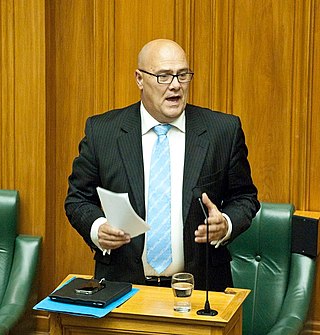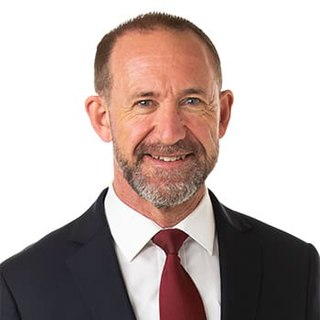Related Research Articles

Sir David Cunningham Carter is a New Zealand National Party politician who served as the 29th Speaker of the New Zealand House of Representatives from 2013 to 2017 and as a Cabinet Minister in the Fourth and Fifth National Governments. He represented the Selwyn electorate in the 44th Parliament and the Banks Peninsula electorate in the 45th Parliament. He served as a list MP from 1999 until he retired at the 2020 election.

Taito Phillip Hans Field was a Samoan-born New Zealand trade unionist and politician. A Member of Parliament (MP) for South Auckland electorates from 1993 to 2008, Field was the first New Zealand MP of Pasifika descent. He was a minister outside Cabinet in a Labour-led government from 2003 to 2005.

Raymond Tau Henare is a former New Zealand Māori parliamentarian. In representing three different political parties in parliament—New Zealand First, Mauri Pacific and the National Party—Henare served as a Member of Parliament (MP) from 1993 to 1999 and from 2005 to 2014.

Charles Pierre Chauvel is a New Zealand lawyer and former New Zealand politician who was a Labour list Member of Parliament (2006–2013) until his resignation to take up a position with the UN Development Programme. He was the first New Zealand MP of Tahitian ancestry.

New Zealand lesbian, gay, bisexual, and transgender (LGBT) rights are some of the most extensive in the world. The protection of LGBT rights is advanced, relative to other countries in Oceania, and among the most liberal in the world, with the country being the first in the region to legalise same-sex marriage.
Tim Selwyn is a New Zealand political activist who was found guilty of sedition on 8 June 2006, the first person charged with sedition in New Zealand for more than 30 years. He is also editor of Tumeke! magazine, and has a blog with the same name.

Andrew James Little is a New Zealand lawyer, former politician and former trade union official. He was Leader of the Labour Party and Leader of the Opposition from 2014 to 2017 and a senior minister in the Labour governments led by Jacinda Ardern and Chris Hipkins from 2017 to 2023, including as Minister for Treaty of Waitangi Negotiations, Minister of Justice, Minister of Health and Minister of Defence.

The use of cannabis in New Zealand is regulated by the Misuse of Drugs Act 1975, which makes unauthorised possession of any amount of cannabis a crime. Cannabis is the fourth-most widely used recreational drug in New Zealand, after caffeine, alcohol and tobacco, and the most widely used illicit drug. In 2001 a household survey revealed that 13.4% of New Zealanders aged 15–64 used cannabis. This ranked as the ninth-highest cannabis consumption level in the world.

The Sensible Sentencing Trust was a political advocacy group based in Napier, New Zealand. The Trust's stated goal is "to educate both the public and victims of serious violent and/or sexual crime and homicide" It focuses on advocating for the rights of victims and tougher penalties against offenders.

Crime in New Zealand encompasses criminal law, crime statistics, the nature and characteristics of crime, sentencing, punishment, and public perceptions of crime. New Zealand criminal law has its origins in English criminal law, which was codified into statute by the New Zealand parliament in 1893. Although New Zealand remains a common law jurisdiction, all criminal offences and their penalties are codified in New Zealand statutes.

Gareth Thomas Llewelyn Hughes is a New Zealand activist and a former politician of the Green Party. He was a member of the New Zealand Parliament for eleven years, from 2010 to 2020. He first took a seat part way through the 49th Parliament as the next person on the Green party list following the retirement of Jeanette Fitzsimons in February 2010. He did not stand for re-election in the 2020 general election.

Hilary Jane Calvert is a lawyer and a former member of the New Zealand parliament for the ACT Party. Following the resignation of ACT MP David Garrett in September 2010, she assumed a position in the House of Representatives as the next MP on ACT's list. In 2013 she was elected to the Dunedin City Council, after a failed campaign for mayor.

Kristopher John Faafoi is a former New Zealand Labour Party politician. He became the Member of Parliament for the Mana electorate in 2010. He did not contest the seat as an electorate MP in 2020 but continued as a list MP. He held a number of ministerial portfolios in the Sixth Labour Government from 2017, until he announced his retirement from politics in June 2022.
Ian Robert Flockhart McKelvie is a New Zealand politician. He represented the National Party in the New Zealand House of Representatives from 2011 to 2023.
Darroch Leicester Ball is a New Zealand politician of the New Zealand First party.

Kiritapu Lyndsay Allan, known as Kiri Allan, is a New Zealand lawyer and former politician. She was a member of Parliament (MP) in the New Zealand House of Representatives from 2017 to 2023, representing the Labour Party in the East Coast electorate.

The Sentencing and Parole Reform Act 2010 was an Act of Parliament in New Zealand that denied parole to repeat violent offenders, and imposed maximum terms of imprisonment on repeat offenders who commit three serious violent offences - unless it would be manifestly unjust. The law was known informally in New Zealand public, media and government circles as the "three-strikes law".

Nicole Raima McKee is a New Zealand politician. She has been a Member of Parliament for ACT New Zealand since the 2020 general election. She currently serves as the 12th Minister for Courts and Associate Minister of Justice (Firearms).

The Three Strikes Legislation Repeal Act 2022 is an omnibus Act of Parliament passed by the New Zealand Parliament that repeals the elements of the Sentencing and Parole Reform Act 2010, which constitute the so-called three-strikes law. The bill passed its third reading on 9 August 2022 with the support of the governing Labour Party, the allied Green Party, the Māori Party but was opposed by the opposition National and ACT parties. The following year the Sixth National Government took power and has pledged to reinstate the three strikes law.
References
- 1 2 "Embattled ACT MP David Garrett quits party". Radio New Zealand. 17 September 2010. Archived from the original on 15 December 2019. Retrieved 17 September 2010.
- 1 2 3 Nicky Park (23 September 2010). "Disgraced NZ MP quits politics". The Sydney Morning Herald. Archived from the original on 15 December 2019. Retrieved 23 September 2010.
- ↑ Wall, Tony (4 December 2011). "Ex-MP Garrett's life in ruins". Stuff.co.nz . Archived from the original on 13 March 2018. Retrieved 23 August 2015.
- ↑ Wall, Tony (3 December 2011). "'I was a roughneck by occupation and by behaviour'". Stuff. Retrieved 29 March 2021.
- ↑ Gower, Patrick (11 November 2008). "New MP looking for action on tougher sentencing". The New Zealand Herald . Archived from the original on 21 October 2012. Retrieved 4 April 2009.
- ↑ "Sensible Sentencing Trust defends Garrett". One News (New Zealand) . 16 September 2010. Archived from the original on 5 May 2013. Retrieved 9 May 2012.
- ↑ 'I was a roughneck by occupation and by behaviour', Stuff, 4 December 2011
- ↑ ""Three Strikes" Legislation—Reasons for Government Support". House of Representatives. 4 May 2010. Archived from the original on 7 May 2010. Retrieved 25 September 2010.
- 1 2 Ex-MP David Garrett pleads not guilty Archived 9 November 2011 at the Wayback Machine , NZ Herald 8 November 2011
- 1 2 "Court releases details on MP's passport fraud". RNZ. 16 September 2010. Retrieved 29 March 2021.
- ↑ Gay, Edward; Romanos, Amelia. "Ex-MP David Garrett suspended from bar". NZ Herald. Retrieved 29 March 2021.
- ↑ Neale, Imogen (13 February 2012). "Ex-MP admits drink-driving". Stuff. Retrieved 29 March 2021.
- ↑ "Personnel". Tongalawyers.com. 21 March 2012. Archived from the original on 29 May 2015. Retrieved 25 August 2015.